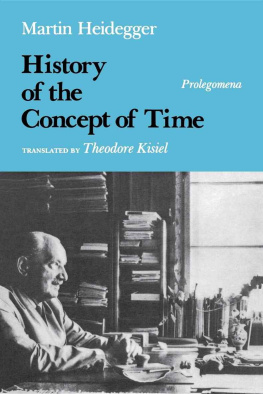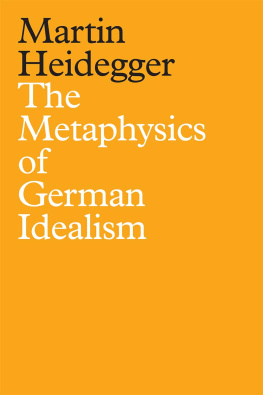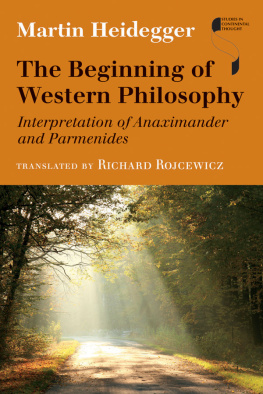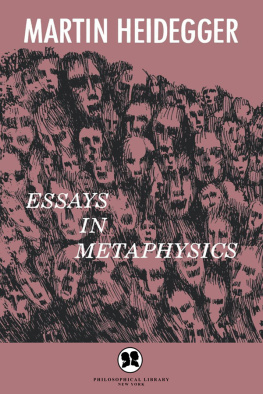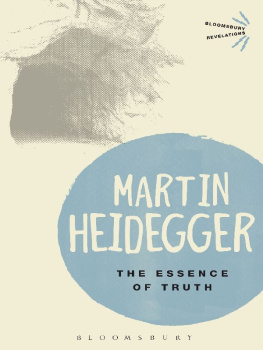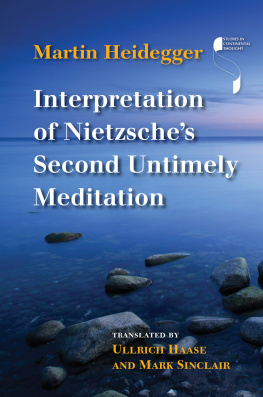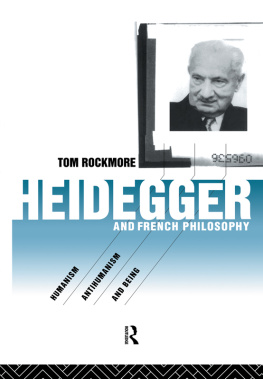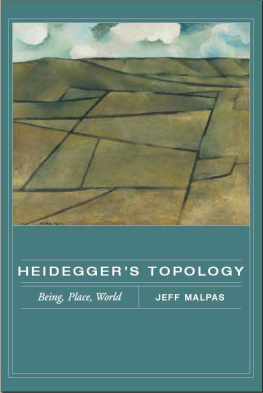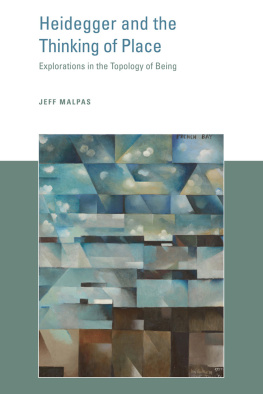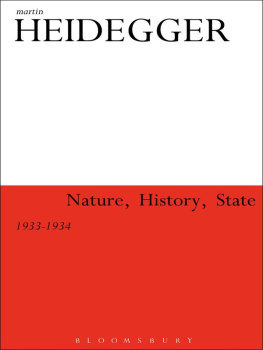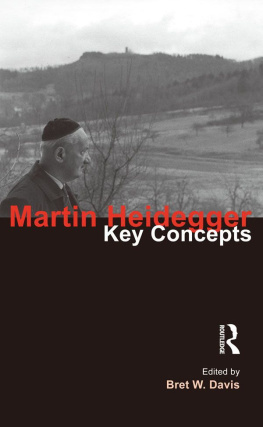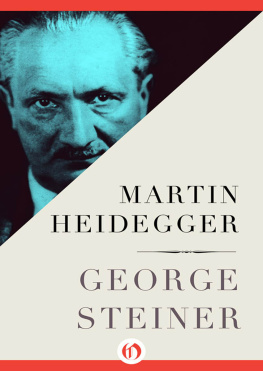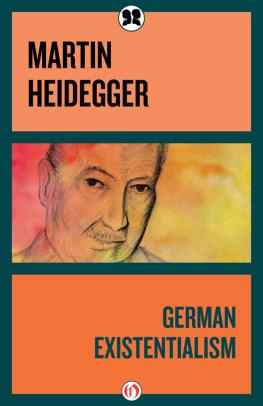Martin Heidegger - History of the Concept of Time: Prolegomena
Here you can read online Martin Heidegger - History of the Concept of Time: Prolegomena full text of the book (entire story) in english for free. Download pdf and epub, get meaning, cover and reviews about this ebook. year: 2010, publisher: Indiana University Press, genre: Religion. Description of the work, (preface) as well as reviews are available. Best literature library LitArk.com created for fans of good reading and offers a wide selection of genres:
Romance novel
Science fiction
Adventure
Detective
Science
History
Home and family
Prose
Art
Politics
Computer
Non-fiction
Religion
Business
Children
Humor
Choose a favorite category and find really read worthwhile books. Enjoy immersion in the world of imagination, feel the emotions of the characters or learn something new for yourself, make an fascinating discovery.
- Book:History of the Concept of Time: Prolegomena
- Author:
- Publisher:Indiana University Press
- Genre:
- Year:2010
- Rating:5 / 5
- Favourites:Add to favourites
- Your mark:
- 100
- 1
- 2
- 3
- 4
- 5
History of the Concept of Time: Prolegomena: summary, description and annotation
We offer to read an annotation, description, summary or preface (depends on what the author of the book "History of the Concept of Time: Prolegomena" wrote himself). If you haven't found the necessary information about the book — write in the comments, we will try to find it.
History of the Concept of Time: Prolegomena — read online for free the complete book (whole text) full work
Below is the text of the book, divided by pages. System saving the place of the last page read, allows you to conveniently read the book "History of the Concept of Time: Prolegomena" online for free, without having to search again every time where you left off. Put a bookmark, and you can go to the page where you finished reading at any time.
Font size:
Interval:
Bookmark:
History
of the
Concept of Time
Studies in Phenomenology and
Existential Philosophy
GENERAL EDITOR
JAMES M. EDIE
CONSULTING EDITORS
David Carr | William L. McBride |
Edward S. Casey | J. N. Mohanty |
Stanley Cavell | Maurice Natanson |
Roderick M. Chisholm | Frederick Olafson |
Hubert L. Dreyfus | Paul Ricoeur |
William Earle | John Sallis |
J. N. Findlay | George Schrader |
Dagfinn Fllesdal | Calvin O. Schrag |
Marjorie Grene | Robert Sokolowski |
Dieter Henrich | Herbert Spiegelberg |
Don Ihde | Charles Taylor |
Emmanuel Levinas | Samuel J. Todes |
Alphonso Lingis | Bruce W. Wilshire |
CONSULTANTS FOR HEIDEGGER TRANSLATIONS
Albert Hofstadter
Theodore Kisiel
John Sallis
Thomas Sheehan
Martin Heidegger
of the
Concept of Time
Prolegomena
TRANSLATED BY
Theodore Kisiel

Preparation of this book was aided by a grant from the Program for Translations of the National Endowment for the Humanities, an independent federal agency.
A translators introduction to this volume, by Theodore Kisiel, is published separately as On the Way to Being and Time: Introduction to the Translation of Heideggers Prolegomena zur Geschichte des Zeitbegriffs, Research in Phenomenology XV (1985).
Published in German as Prolegomena zur Geschichte des Zeitbegriffs
This book is a publication of
Indiana University Press
601 North Morton Street
Bloomington, Indiana 47404-3797 USA
http://iupress.indiana.edu
Telephone orders 800-842-6796
Fax orders 812-855-7931
Orders by e-mail
First paperback edition 1992
1979 by Vittorio Klostermann
1985 by Indiana University Press
All rights reserved
No part of this book may be reproduced or utilized in any form or by any means, electronic or mechanical, including photocopying and recording, or by any information storage and retrieval system, without permission in writing from the publisher. The Association of American University Presses Resolution on Permissions constitutes the only exception to this prohibition.
The paper used in this publication meets the minimum requirements of American National Standard for Information SciencesPermanence of Paper for Printed Library Materials, ANSI Z39.48-1984.
Manufactured in the United States of America
Library of Congress Cataloging-in-Publication Data
Heidegger, Martin, 18891976.
[Prolegomena zur Geschichte des Zeitbegriffs. English]
History of the concept of time : prolegomena / Martin Heidegger ; translated by
Theodore Kisiel. 1st Midland book ed.
p. cm. (Studies in phenomenology and existential philosophy)
Translation of: Prolegomena zur Geschichte des Zeitbegriffs.
ISBN 978-0-253-32730-7. ISBN 978-0-253-20717-3 (pbk.)
1. Time. 2. Phenomenology. I. Title. II. Series.
B3279.H48P7613 1992 91-34210
11 12 13 14 16 15 14 13
Analysis of the Phenomenon of Time
and Derivation of the Concept of Time
Preparatory Description of the Field in Which
the Phenomenon of Time Becomes Manifest
The text here translated is that of a course of lectures that Heidegger gave at the University of Marburg during the summer semester 1925. The title of the course was Geschichte des Zeitbegriffs. The course also bore the subtitle Prolegomena zu einer Phnomenologie von Geschichte und Natur.
The German text was prepared for publication by Petra Jaeger on the basis of Heideggers handwritten manuscript and Simon Mosers transcription of the lectures, which was authorized and supplemented by Heidegger himself; it was published in 1979 as volume 20 of Heideggers Gesamtausgabe under the. title Prolegomena zur Geschichte des Zeitbegriffs. As with the entire Gesamtausgabe, the intention was to present not a critical edition of the text but a text prepared from the manuscript as Heidegger left it, supplemented editorially by the available transcriptions but without critical apparatus. For further information regarding the preparation of the text, the reader may consult the Editors Epilogue, which follows the translation of the text. The reader may also want to consult the extended discussion of this text in Theodore Kisiels essay, On the Way to Being and Time: Introduction to the Translation of Heideggers Prolegomena zur Geschichte des Zeitbegriffs, Research in Phenomenology XV (1985).
The lecture course, as Heidegger outlines it in 3, was to have consisted of three parts, the first deriving the concept of time, the second disclosing the history of the concept of time, the third elaborating the horizon for the question of being in general and of the being of history and nature in particular. In the actual lectures Heidegger completed only an extended Introduction (entitled by the editor: Preliminary Part) and the first of the three projected parts (entitled by the editor: Main Part). In the Preliminary Part Heidegger presents what is perhaps his most extended discussion and critique of Husserls phenomenology. The Main Part represents the penultimate draft of Division One (and a sketchy beginning of Division Two) of Being and Time, which was published less than two years after the completion of the lecture course. Although in the lectures some precise matters of terminology such as the distinction between uncoveredness or discoveredness (Entdecktheit) and disclosedness (Erschlossenheit) are not yet fixed in the form they will have in Being and Time, there are major portions of this text that were taken over into Being and Time with only moderate revision. The Main Part of the course is thus itself an elaboration of the celebrated lecture that Heidegger gave to the theology faculty at the University of Marburg in July 1924, less than a year after he arrived. This lecture, The Concept of Time, is the one that Gadamer has called the original form (Urform) of Being and Time. It is now known that in the months after he presented it, Heidegger used it as the basis for an essay with the same title but several times the length of the lecture. It was presumably this essay, which remained unpublished and until recently unknown, that formed the immediate basis for the Main Part of History of the Concept of Time.
The notes and note numbering of the German edition are reproduced in the present translation, but errors have been corrected and bibliographical information has been added as needed. References are given to extant English translations of the texts cited in the lecture course, although the quoted passages have been freshly translated here. The numbered footnotes reproduce those in the German edition; additional remarks by the translator are appended in square brackets, which also set off translators insertionse.g., the German word, translations from the Latin, clarifying phrases and numeralsin the body of the text. The numbers in the running heads refer to the pagination of the German edition. The rare additional remark by Heidegger or by the German editor incorporated into the body of the text, typically in the citations, is indicated by braces: { }. Notes added by the translator are indicated by asterisks. The articulation of the text into divisions and chapters is taken from Heidegger himself; the division into numbered sections, the titles of these sections, and the further subdivisions were added by Jaeger.
Next pageFont size:
Interval:
Bookmark:
Similar books «History of the Concept of Time: Prolegomena»
Look at similar books to History of the Concept of Time: Prolegomena. We have selected literature similar in name and meaning in the hope of providing readers with more options to find new, interesting, not yet read works.
Discussion, reviews of the book History of the Concept of Time: Prolegomena and just readers' own opinions. Leave your comments, write what you think about the work, its meaning or the main characters. Specify what exactly you liked and what you didn't like, and why you think so.

